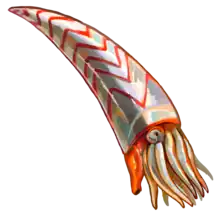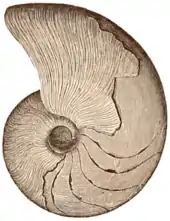| Plectronoceras Temporal range: Late Cambrian ~ | |
|---|---|
 | |
| Life reconstruction of P. cambria | |
| Scientific classification | |
| Domain: | Eukaryota |
| Kingdom: | Animalia |
| Phylum: | Mollusca |
| Class: | Cephalopoda |
| Subclass: | Nautiloidea |
| Order: | †Plectronocerida |
| Family: | †Plectronoceridae |
| Genus: | †Plectronoceras Ulrich & Foerste, 1933 |
| Species | |
| |
Plectronoceras is the earliest known shelled cephalopod, dating to the Late Cambrian.[1][2][3] None of the fossils are complete, and none show the apex or aperture of the shell.[3] Approximately half of its shell was filled with septa; 7 were recorded in a 2 centimetres (0.79 in) shell.[4] Its shell contains transverse septa separated by about half a millimetre, with a siphuncle on its concave side.[3] Its morphology matches closely to that hypothesised for the last common ancestor of all cephalopods.[3]
Plectronoceras is the type genus of the family Plectronoceratidae. Fossils of Plectronoceras have been found in the San Saba Limestone of Texas.[2]
References
- ↑ Dzik, J. (1981). "Origin of the cephalopoda" (PDF). Acta Palaeontologica Polonica. 26 (2): 161–191.
- 1 2 Plectronoceras at Fossilworks.org
- 1 2 3 4 Clarke, M.R. (1985), "Main features of cephalopod evolution", in Wilbur, Karl M.; Clarke, M.R.; Trueman, E.R. (eds.), The Mollusca, vol. 12. Paleontology and neontology of Cephalopods, New York: Academic Press, ISBN 0-12-728702-7
- ↑ Webers, G. F.; Yochelson, E. L. (1989). "Late Cambrian molluscan faunas and the origin of the Cephalopoda". In Crame, J. A. (ed.). Origins and Evolution of the Antarctic Biota. Vol. 47. Geological Society, London: Special Publications. p. 29. doi:10.1144/GSL.SP.1989.047.01.04.
This article is issued from Wikipedia. The text is licensed under Creative Commons - Attribution - Sharealike. Additional terms may apply for the media files.
